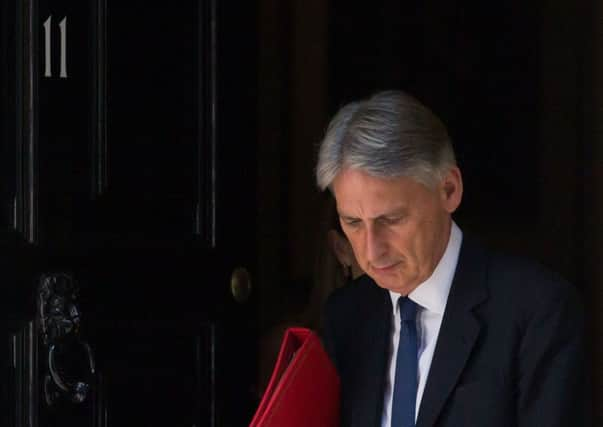Chancellor faces tough balancing act despite lower borrowing
This article contains affiliate links. We may earn a small commission on items purchased through this article, but that does not affect our editorial judgement.


Official figures showed that public sector net borrowing, excluding money pumped into bailed-out banks, fell to a lower-than-expected £6.7 billion in May, down £300 million on a year earlier.
It marked the lowest borrowing level for the month since 2007, and came in below economists’ forecasts of about £7.5bn.
• READ MORE: Markets and economy news
Advertisement
Hide AdAdvertisement
Hide AdHammond faces an increasingly tough challenge to keep borrowing in check, with rising inflation likely to dent consumer spending and cause the economy to slow.
Meanwhile, the Office for National Statistics also revealed a brighter picture for net borrowing for the financial year to date, which came in at its smallest amount since 2008. It said the budget deficit for the period from April to May this year fell by £100m to £16.1bn compared with a year earlier.
The Office for Budget Responsibility, Britain’s fiscal referee, expects the UK government to record a deficit of £58.3bn for the financial year to March 2018.
John Hawksworth, chief economist at PwC, said the latest snapshot of the public finances was “good news” for the Chancellor, but warned that he faced some “tough challenges ahead”.
“The economy is slowing and considerable uncertainties remain around the outcome of the Brexit negotiations,” he noted.
“At the same time, political pressures for higher spending on health, social care, education, policing, social housing and public pay more generally have increased.
Advertisement
Hide AdAdvertisement
Hide Ad“The Chancellor therefore still faces some tough challenges ahead if he is to meet his target of a balanced budget by 2025.”
• READ MORE: Holiday costs push inflation towards four-year high
Howard Archer, chief economic advisor to the EY Item Club, said the public coffers were buoyed last month by a 5.1 per cent year-on-year increase in tax receipts and, in particular, record levels of VAT receipts for the month.
But he cautioned: “While the public finances showed fractional improvement in the first two months of 2017/18, they are still in far from healthy shape.
“Pressure on the government to recalibrate fiscal policy away from austerity is likely to result in limited adjustments to the fiscal approach rather than radical changes in November’s Budget.
“The Chancellor appeared open to such an approach in his key Mansion House speech, but stated that he remains committed to the fiscal rules set out at the Autumn Statement, which lead to a balanced budget by mid-2020. However, there is some wiggle room within this.”
Among recent pledges, the Prime Minister vowed to deliver a balanced budget by the “middle of the next decade”.